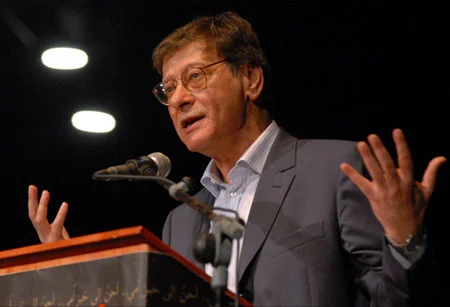Mahmoud Darwish was a Palestinian poet and author who was regarded as Palestine’s national poet.
In 1988 Darwish wrote the Palestinian Declaration of Independence, which was the formal declaration for the creation of a State of Palestine.
Darwish won numerous awards for his works. In his poetic works, Darwish explored Palestine as a metaphor for the loss of Eden, birth and resurrection, and the anguish of dispossession and exile.
He has been described as incarnating and reflecting “the tradition of the political poet in Islam, the man of action whose action is poetry”.
He also served as an editor for several literary magazines in Israel and the Palestinian territories. Darwish wrote in Arabic and also spoke English, French, and Hebrew.
Childhood

Mahmoud Darwish was born in 1941 in al-Birwa in the Western Galilee, the second child of Salim and Houreyyah Darwish.
His family were landowners. His mother was illiterate, but his grandfather taught him to read.
During the Nakba, his village was captured by Israeli forces and the family fled to Lebanon, first to Jezzine and then to Damour.
Their home village was razed and destroyed by the IDF to prevent its inhabitants from returning to their homes inside the new Jewish state.
A year later Darwish’s family returned to the Acre area in Israel and settled in Deir al-Asad. Darwish attended high school in Kafr Yasif, two kilometers north of Jadeidi.
He eventually moved to Haifa. Though Israel’s 1952 citizenship law granted citizenship to Palestinian Arabs in Israel, Darwish and his family were never granted citizenship, being considered residents rather than citizens of Israel.
He published his first book of poetry, Asafir bila ajniha, or “Wingless Birds”, at the age of 19.
He initially published his poems in Al Jadid, the literary periodical of the Israeli Communist Party, eventually becoming its editor. Darwish was a member of Rakah, the Israeli Communist Party.
Later, he was assistant editor of Al Fajr, a literary periodical published by the Israeli Workers Party (Mapam).
Literary career

Over his lifetime of 67 years, Darwish published more than 30 volumes of poetry and eight books of prose. At one time or another, he was editor of the periodicals Al Jadid, Al Fajr, Shu’un Filastiniyya, and Al Karmel.
He was also one of the contributors of Lotus, a literary magazine financed by Egypt and the Soviet Union.
Darwish’s early writings are in the classical Arabic style. He wrote monorhymed poems adhering to the metrics of traditional Arabic poetry.
In the 1970s he began to stray from these precepts and adopted a “free verse” technique that did not abide strictly by classical poetic norms.
The quasi-Romantic diction of his early works gave way to a more personal, flexible language, and the slogans and declarative language that characterised his early poetry were replaced by indirect and ostensibly apolitical statements, although politics was never far away.
Death

Mahmoud Darwish died on 9 August 2008 at the age of 67, three days after heart surgery at Memorial Hermann Hospital in Houston, Texas.
Before surgery, Darwish had signed a document asking not to be resuscitated in the event of brain death.
According to Ibrahim Muhawi, the poet, though suffering from serious heart problems, did not require urgent surgery, and the day set for the operation bore a symbolic resonance.
In his Memory for Forgetfulness, Darwish centered the narrative of Israel’s invasion of Lebanon and 88-day siege of Beirut on 6 August 1982, which was the anniversary of the bombing of Hiroshima.
Mahmoud Darwish Quotes
“We are captives, even if our wheat grows over the fences/ and swallows rise from our broken chains/ We are captives of what we love, what we desire, and what we are.”
They taught me I had a language in heaven
and another language on earth.”
― Mahmoud Darwish, Unfortunately, It Was Paradise: Selected Poems
I don’t want to return now to the fortress of my father’s house.
Take me to your vineyard.
Let me meet your mother.
Perfume me with basil water.
Arrange me on silver dishes, comb me,
imprison me in your name,
let love kill me.”
single word: Home.”
poem to my wife’s heart. They laughed, and took from me
only the words dedicated to my wife’s heart.”
what you did and what you do to my soul.”
a high moon made in Baghdad, neither Arab, nor Persian,
nor claimed by the goddesses all around us.”
He is so afraid of his soul:
no “I” now but she. She is now within me.
And no “she” now but only my fragile “I”
At the end of this song, how much I fear that my dream
may not see its dream in her.”
Mythical women applaud us. A sea for us, a sea against us.”
she says: Is there a wall to hang it on?
I say: We’ll build a room for it. Where? In any house.”
It’s the end of what was bound to end! Where is that which ends?
Where can I free myself of the homeland in my body?”
There must be a divine purpose for the Prophet to triumph.”
it can illuminate the nights.
With the glow of an apple, it fills two bodies with light
and with a gardenia’s breath, it can revive a homeland!”
and gazed much longer at the last sky before moonset?
Addresses for the soul, outside this place. I love to travel
to any wind … But I don’t love to arrive.”
